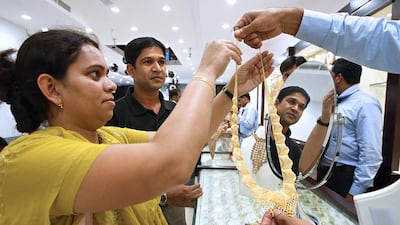The UAE’s gold jewellery business lost some of its sheen in the first quarter.
Demand for gold jewellery in the UAE fell, but to a smaller extent compared with the wider Middle East as it was tempered by the Dubai Shopping Festival and purchases from Indian residents ahead of the Akshaya Tritiya festival, according to the World Gold Council.
Consumer demand for gold from the region dropped 18 per cent to 83.6 tonnes in the first three months of the year from 102.3 tonnes in the same period last year, the council said. That was mainly owing to a sharp drop in demand from Egypt amid a flare-up in violence.
As a result, demand for gold jewellery in Egypt dropped 31 per cent, its lowest level since the second quarter of 2012.
Meanwhile in the UAE, demand for gold jewellery only fell 8 per cent to 16.5 tonnes in the first three months of the year from 18 tonnes in the corresponding period last year.
Junaid Khan, the head of trading – treasury at National Bank of Fujairah, said demand for gold “remained weak given its position against the dollar over the last 14 months”.
“Despite these negative factors, we feel investors and consumers are likely to stage a comeback in the quarters ahead.”
Pradeep Unni, the head of trading for commodities and currencies at Richcomm Global Services in Dubai, said that the Dubai Shopping Festival during the early part of the year supported the market well.
“The UAE is largely a trade centre and also a favourite tourist destination; thus jewellery and gold trade here is unlikely to mirror the demand trends in other parts of the world,” Mr Unni added.
About 2.6 million Indians live in the UAE, making them the biggest expatriate population in the country. Hindus typically buy gold on Akshaya Tritiya, when buying bullion is thought to impart good luck and increase wealth.
“Akshaya Tritiya is gaining traction in the market as a gold buying occasion, catering to the expat Indian community,” the report said. “This emerging trend has positive implications for future demand given the size of the Indian population.”
Demand for gold jewellery in India rose 22 per cent in the first quarter to 150.7 tonnes from 123.5 tonnes in the corresponding time frame the previous year.
The World Gold Council said that outlook for demand in India remained strong because of expectations the country’s economy will continue to grow following the election of the economic reform-minded prime minister Narendra Modi last year.
Retailers in India reported an increase of growth in sales of 10 to 15 per cent because of buoyant demand for gold during the Akshaya Tritiya festival.
Globally, the demand for gold slipped 1 per cent to 1,079.3 tonnes as a pick-up in demand in India and the US was outweighed by a drop in demand from China, where a rally in equities attracted funds that might have gone into gold buying.
Gold had its first annual price decline in 2013 since 2000 as investors sold the metal and loaded up on equities and other assets to take advantage of cheap money made available by central banks to stimulate economic growth.
Gold, the safe-haven asset bought in times of trouble and high inflation, dropped 28 per cent in 2013, its biggest yearly fall since 1981. Last year gold slipped 0.3 per cent and so far this year it is up 1.7 per cent.
Declines in bullion prices have not been bad for everyone because demand for physical gold is still healthy.
In Asian and Middle Eastern emerging markets such as India and Egypt that have volatile currencies, individuals have increased gold purchases to preserve the value of their wealth.
mkassem@thenational.ae
Follow The National's Business section on Twitter

